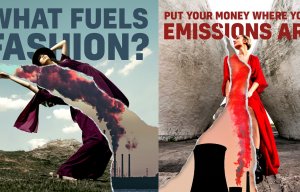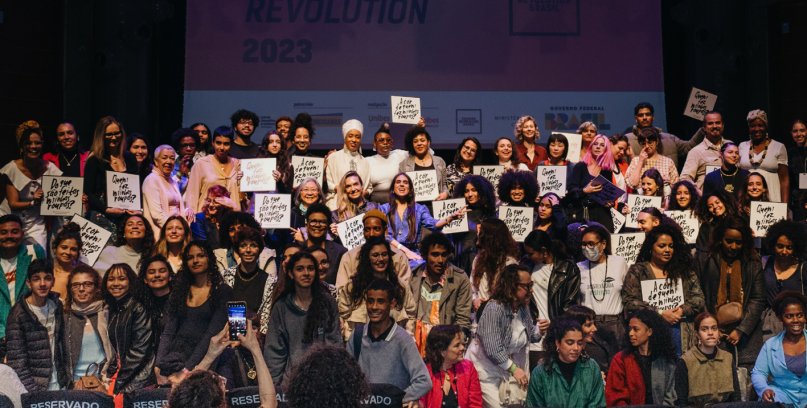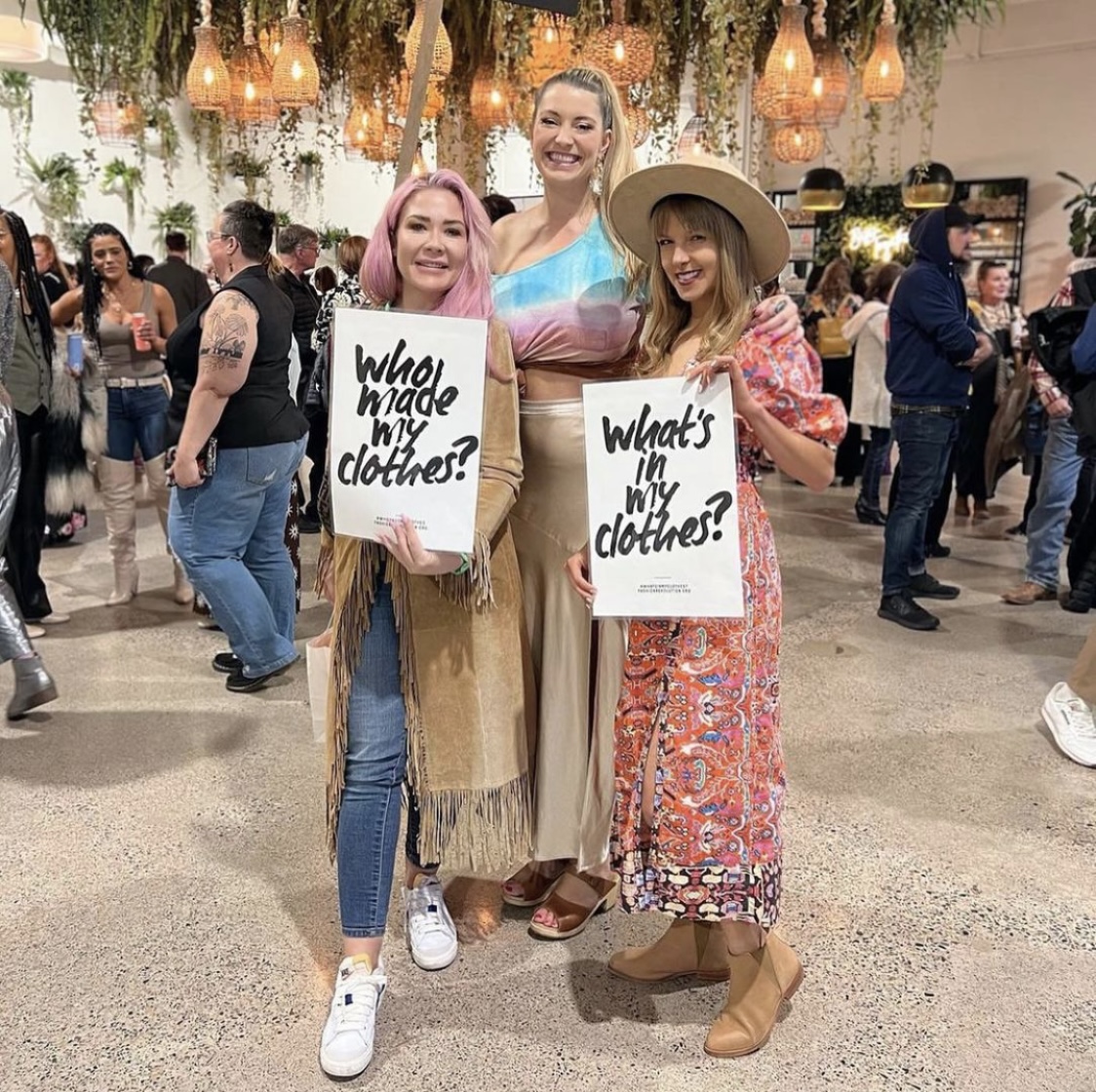
Brands are falling short, says Fashion Revolution
Organisation marks ten years of campaigning for positive change ahead of Fashion Revolution Week 2024.

10th April 2024
Innovation in Textiles
|
London
London-headquartered Fashion Revolution was formed in response to the Rana Plaza factory collapse which exposed the world to the exploitation at the centre of the global fashion industry. After the collapse, rescuers had to dig through the rubble looking for clothing labels to figure out which brands were producing clothes there, unearthing the urgent and vital need for transparency in respect of where and how clothes are made.
A year later, Fashion Revolution started to ask a simple question that proved impossible for brands to answer: “Who made my clothes?”
This question sparked the beginning of a global movement for transparency to demand justice and dignity for garment manufacturers.
To increase pressure on the industry and give citizens the data they need to power activism, the Global Fashion Transparency Index was launched in 2017 to measure what big fashion is saying about its human rights and environmental practices.

Brand transparency has subsequently become a key evaluation point for investors and asset management funds.
The Fashion Revolution movement is now strong across 80 countries globally, united by a common vision of a global fashion industry that conserves and restores the environment and values people over growth and profit.
As Fashion Revolution marks its tenth anniversary with Fashion Revolution Week 2024 from April 15-24, it is reflecting on what progress has been made in the global fashion industry over the last ten years, and is looking ahead to key areas which still urgently need to be addressed.
Transparency
Over the last decade, transparency has entered the mainstream, with some of the world’s largest fashion brands making encouraging progress. Since its launch in 2017, the Fashion Transparency Index (FTI) has seen 86% of major fashion brands continuously increase their levels of disclosure by an average of fifteen percentage points, and some by up to 54%.
From just 100 brands initially, today the FTI has expanded to encompass 250 of the world’s largest brands, with 61% actively engaging. In 2023, for the first time, two brands scored 80% or higher on the Global FTI. After years of slow movement in the luxury fashion sector – when transparency of supplier lists seemed unimaginable – some luxury brands are now disclosing this information even down to raw material level, with the five biggest movers being all luxury brands in 2023.

Overall, despite the FTI being in its eighth iteration, far too many brands still disclose nothing year after year, and industry-wide, progress remains painfully slow, with the overall average score of brands currently only 26%.
Looking to the future
Looking ahead, Fashion Revolution believes there are five key areas the industry must focus on in order to make meaningful progress:
- Unfair purchasing practices continue to be the backbone of exploitation in the fashion industry. By paying late, changing orders last minute, or simply cancelling fulfilled orders, brands are perpetuating an abusive and volatile cycle that systematises poverty, as factory owners and suppliers may be forced to make workers stay late to finish orders and are unable to pay their workers on time, or even at all. Meanwhile, customers are sometimes wearing clothes before big brands have paid the factories that made them. Covid-19 order cancellations saw unprecedented wage theft. Brand commitments to sustainability will always ring hollow if they continue to perpetrate these unfair purchasing practices that drive labour abuses for the people who make our clothes. If this does not change, nothing will.
- Despite big fashion brands promising fair pay to the workers who make their clothes, they have little to show on progress over the last decade. In-work poverty has actually deepened at worker level. Living wages are the most important issue, yet 99% of the brands in the Global Fashion Transparency Index still do not disclose the percentage of workers in their supply chain paid a living wage rate. Poverty pay is perpetuated when workers’ rights to freedom of association and collective bargaining are repressed. It is by no coincidence that big fashion sources from regions of the world where these rights are limited, despite resounding commitments to protect them. With workers bravely protesting for higher pay, freedom of association is even more critical after the recent crackdowns on garment worker protests, where workers lost their lives demanding an increase in Bangladesh’s minimum wage negotiations.
- The climate crisis is growing in intensity and urgency and yet, in 2023, little more than a third of the world’s largest brands disclosed a time-bound and measurable near-term target for decarbonisation verified by the Science-based targets Initiative, with even less (12%) disclosing a long-term target for 2040-2050. Despite this, just 9% of brands reviewed disclosed their level of annual investment in decarbonisation. Raw material production and processing are the most carbon-intensive stages in the supply chain and require the most investment, innovation and long-term planning.
- With an estimated $1 trillion required to cut roughly 50% of emissions by 2030 it’s time for big fashion to put its money where its emissions are and support suppliers to transition to clean energy. The dire need for investment in decarbonisation is underlined by the fact that stakeholders across global value chains are experiencing the impacts of the climate crisis now.
- Churning out enormous volumes of clothes each year and promoting a culture of overconsumption is antithetical to sustainability and climate justice, yet overproduction remains the elephant in the room. The fashion industry must be held accountable for driving overconsumption and significantly reduce production levels. Big fashion brands must also take responsibility for the waste they create.
Legislation
The fashion industry must be held accountable for the human rights abuses and environmental destruction within its supply chains by binding legislation, Fashion Revolution concludes, and if the last ten years have shown anything, it’s that voluntary schemes don’t work. Governments must regulate the fashion industry by focusing on addressing the root cause of the issues and putting an end to brands self-assessments. Progress on corporate accountability legislation globally is welcome, but in its current forms fails to deliver worker justice. Converging climate and social injustice is the crisis of our time.

Business intelligence for the fibre, textiles and apparel industries: technologies, innovations, markets, investments, trade policy, sourcing, strategy...
Find out more